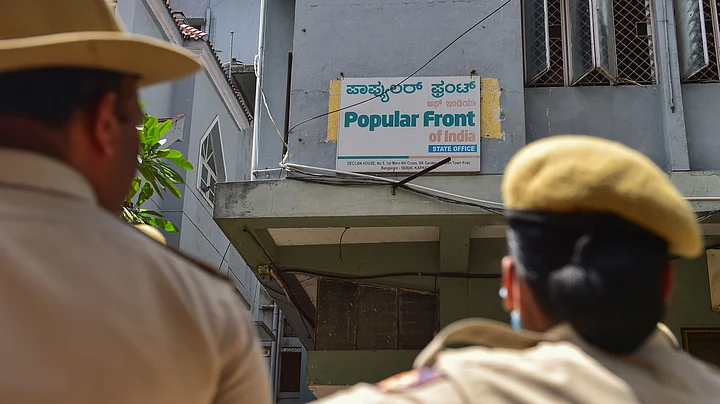A day after the ‘largest-ever raids’ by the National Investigation Agency (NIA) and the Enforcement Directorate (ED) on the Popular Front of India (PFI) on Thursday, 22 September, Kerala witnessed widespread vandalism and violence, following which the Kerala High Court took suo motu cognizance of the matter.
NIA and ED, along with the state police, on Thursday raided 93 locations across 15 states, and arrested over 100 PFI members.
An offspring of the National Democratic Front (NDF), PFI came to the fore in 2006, and has been under the scanner of central investigation agencies for over a decade now. Here are the charges that have been levelled against the organisation and some of its leaders.
Links With SIMI
PFI was formed in 2006 after three organisations – NDF in Kerala, Manitha Neethi Pasarai (MNP) in Tamil Nadu, and Karnataka Forum for Dignity.
Several PFI leaders and cadres had past links with banned outfit Student Islamic Movement in India (SIMI). EM Abdul Rahiman, vice-president of PFI, was the general secretary of SIMI between 1982 and 1993.
Social Democratic Party of India (SDPI) President Abubakar has been the Kerala State President of SIMI while Professor P Koya was also a founding member of SIMI.
SDPI is considered to be the political wing of the PFI.
All three were arrested in the raids on Thursday.
Case Against PFI
NIA, in a detailed report to the Ministry of Home Affairs in 2017, had demanded a ban on PFI for its alleged involvement in terror activities. Several states have also sought a ban on the outfit.
PFI has also allegedly been linked to other violent attacks.
According to a report in Outlook India, PFI workers allegedly chopped off the right hand of Kerala Professor TJ Joseph in July 2010. 12 PFI members were convicted in the case in 2015. Prof. Joseph had allegedly insulted Prophet Mohammed.
In 2014, the Kerala government had submitted an affidavit in the High Court that PFI members have been allegedly involved in 27 political murders, 86 attempt to murder cases and over 125 cases of inciting communal feelings, The Hindustan Times reported.
In 2016, 21 members of PFI were convicted for organising a terror camp in Kannur, Kerala. The same year, central agencies had apprehended ISIS suspects, some of whom turned out to be members of the PFI.
The NIA has also investigated the role of PFI in Sri Lanka’s Easter Bombings, which killed over 200 people. ISIS had claimed the responsibility of those bombings.
In the 2020 Gurudwara attack that took place in Kabul, one of the attackers was allegedly a member of the PFI.
Involvement in CAA Protests and Delhi Riots
ED is probing the PFI for allegedly funding the 2020 Delhi riots as well as protests against the Citizenship Amendment Bill. The Special Cell of Delhi Police is also investigating the role of PFI in allegedly ‘providing logistics’ for the Delhi riots.
In July this year, ahead of Prime Minister Narendra Modi’s visit to Phulwari Sharif in Patna, the police had arrested several suspected terrorists. PFI’s name had sprung up during that investigation as well.
Investigating agencies alleged that these terrorists were being trained at Phulwari Sharif 15 days before PM Modi's visit to Patna.
(At The Quint, we question everything. Play an active role in shaping our journalism by becoming a member today.)
